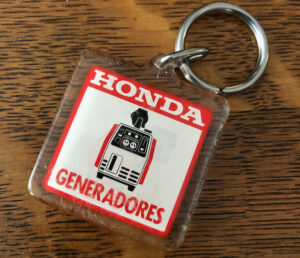
Photo by John Griswold
A moving box (SMALL / PEQUEÑA), taped shut and cut open several times, is labeled with a Sharpie: LIBRARY / KNICKKNACKS / & Watches / & Dive Challenge Coins. Inside are journals, books, and a little wicker basket holding money from several countries, the first pen I carried vocationally, and an acrylic keychain that says Honda Motor on one side and Honda Generadores on the other.
The keychain was given to me by a young Panamanian named Irma, who was staying with friends in Panama City but was from Chiriquí, an interior province. We met at the nightclub on Howard Air Force Base. Many young women who worked as maids and secretaries took chiva buses over the Canal on the Bridge of the Americas for a night at the club. It had a DJ and dance floor, several bars, a restaurant, and a patio with fast food called The Breezeway. Drinks and food were cheap. The women had to be signed in to the club by American soldiers or airmen.
I still take it as proof of Irma’s intelligence that she was alone at a table the night we met, looking bored and irritated as her friends partied with Americans. She had no English, and my Spanish was poor, especially with past and future tenses. I could tell she suffered no fools and had a mind of her own. She had come to the city to be a university student, but something had gone wrong. What I seemed to understand was that she had not enrolled because she had not figured out the buses to campus. Her roommates, who were actually the friends of a cousin, took too much of her money for rent and food. Irma was anxious that her father would be disappointed in her.
We ended up dating for a few weeks, though I was often away on leave, field exercises, or at the NCO academy. I took her to movies, the beach, restaurants, on drives. We made out in my LUV truck behind an abandoned ammo bunker reclaimed by the jungle. She seemed to be traditional, not religious, and did not want to sleep together quickly. I had decided, before I was sent to Panama, that I would not marry a Panamanian, the way American soldiers often marry women from overseas postings. Now I was short, which means to have little time left in an enlistment, and soon I would be returning to the US and going to college, as I had plans to become an army doctor. I was also a bastard.
For Valentine’s Day I determined to get Irma something she could use. Maybe it was to feel less guilty, because I had lost interest in something like a courtship. I did not have much money but bought an elegant little Timex from the PX and put it on the wrist of a teddy bear. There may have been flowers or chocolate. I was such a kid I did not know anything about relationships but clichés. The card I found in Spanish was funny. We went to a Chinese restaurant in the financial district, then I took her home and gave her her gifts in the truck.
She had gotten me a card in both English and Spanish. It was all she could afford. Inside she had written in Spanish, I love you, whatever your heart desires, go after it. I thanked her very much. We sat in the dark outside her not-friends’ place.
Understand? she said. I smiled and thanked her again. She was incredulous. She asked if I knew what it meant. I said, Sure, it’s very pretty. She asked me to read it again and raised her eyebrows. I did, just to satisfy her, and when she asked me to come up I was polite but said, Tengo que irme, I have to go.
She fumbled in her purse. I did not know what was going on. She seemed frantic. She pulled out the acrylic keychain—I think her father was a mechanic—and put it in my hand. I tried, I surely did, but my face must have betrayed some combination of pity, humor, and sadness, and her anger popped like a cork. She sobbed once in frustration and despair at my stupidity, threw open the door, and ran up the stairs and inside. I would not realize what the card had meant for some years. Was anyone who ever lived as innocent and cruel?
There may have been other dates, but in my memory the next time I saw Irma she was sitting alone on the stairs to the club, waiting for me to come and sign her in. I had another girl on my arm, and the look on Irma’s face made me so ashamed I passed without so much as a hello.
